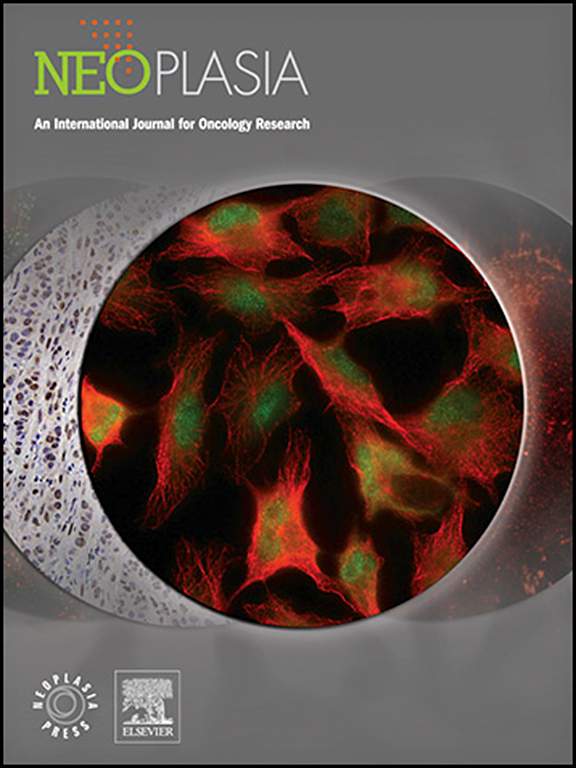多柔比星耐药性涉及干扰素信号、转录突变和 U-ISGF3 相关基因共表达模式的调节
IF 7.7
2区 医学
Q1 Biochemistry, Genetics and Molecular Biology
引用次数: 0
摘要
化疗虽然能有效治疗癌症,但会诱发各种细胞反应,包括衰老和耐药性。在这里,我们研究了常用化疗药物多柔比星(DOX)在人类结肠癌细胞中诱导的转录组变化。利用单细胞 RNA 测序,我们确定了亚毒性 DOX 治疗后不同的细胞群及其转录谱,发现了以细胞周期调控和干扰素(IFN)信号转导相关基因的差异表达为特征的细胞群。据报道,与 ISGF3(U-ISGF3)转录因子的未磷酸化形式有关的基因在 DOX 存在的增殖细胞中表现出上调。此外,我们发现在多柔比星存活的增殖细胞中,预后不良标志物 HSH2D 高度上调,其表达与 U-ISGF3 相关基因相关。通过数学建模分析转录动力学发现,U-ISGF3 相关基因每次转录爆发产生的 mRNA 分子数量增加。我们还观察到 U-ISGF3 相关基因和其他基因在 DOX 治疗后的共表达模式发生了改变,这可能会导致 DOX 存活的增殖细胞产生化疗抗性,并可能影响化疗后癌细胞的命运。我们的研究结果突出表明,U-ISGF3相关基因和JAK/STAT通路是克服结肠癌化疗耐药性的潜在治疗靶点。本文章由计算机程序翻译,如有差异,请以英文原文为准。
Doxorubicin resistance involves modulation of interferon signaling, transcriptional bursting, and gene co-expression patterns of U-ISGF3-related genes
Chemotherapy, although effective in treating cancer, can induce various cellular responses, including senescence and drug resistance. Here, we investigate the transcriptomic alterations induced by doxorubicin (DOX), a commonly used chemotherapeutic agent, in human colon cancer cells. Using single-cell RNA sequencing, we identified distinct cell populations and their transcriptional profiles following subtoxic DOX treatment, revealing cell clusters characterized by differential expression of genes involved in cell cycle regulation and interferon (IFN) signaling. DOX-persisting proliferating cells exhibited upregulation of genes reported to be linked to the unphosphorylated form of ISGF3 (U‐ISGF3) transcription factor. Furthermore, we found that HSH2D, a poor prognostic marker, was highly upregulated in doxorubicin-surviving proliferative cells, and its expression was correlated with U-ISGF3-related genes. Analysis of transcription kinetics via mathematical modeling revealed that the number of mRNA molecules produced per transcriptional burst was increased for U-ISGF3-related genes. We also observed altered gene co-expression patterns of U-ISGF3-related genes and others upon DOX treatment, which potentially contributes to chemoresistance of DOX-surviving proliferative cells and may influence cancer cell fate after chemotherapy. Our findings highlight U-ISGF3-related genes and the JAK/STAT pathway as potential therapeutic targets for overcoming chemoresistance in colon cancer.
求助全文
通过发布文献求助,成功后即可免费获取论文全文。
去求助
来源期刊

Neoplasia
医学-肿瘤学
CiteScore
9.20
自引率
2.10%
发文量
82
审稿时长
26 days
期刊介绍:
Neoplasia publishes the results of novel investigations in all areas of oncology research. The title Neoplasia was chosen to convey the journal’s breadth, which encompasses the traditional disciplines of cancer research as well as emerging fields and interdisciplinary investigations. Neoplasia is interested in studies describing new molecular and genetic findings relating to the neoplastic phenotype and in laboratory and clinical studies demonstrating creative applications of advances in the basic sciences to risk assessment, prognostic indications, detection, diagnosis, and treatment. In addition to regular Research Reports, Neoplasia also publishes Reviews and Meeting Reports. Neoplasia is committed to ensuring a thorough, fair, and rapid review and publication schedule to further its mission of serving both the scientific and clinical communities by disseminating important data and ideas in cancer research.
 求助内容:
求助内容: 应助结果提醒方式:
应助结果提醒方式:


